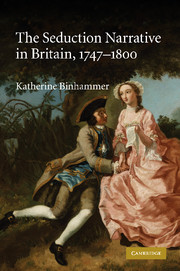Book contents
- Frontmatter
- Contents
- Acknowledgments
- Introduction
- 1 Knowing love: The epistemology of Clarissa
- 2 The whore's love or the Magdalen's seduction
- 3 After knowledge: Married heroines and seduction
- 4 Seduction in street literature
- 5 Melodramatic seduction: 1790s fiction and the excess of the real
- Notes
- Bibliography
- Index
1 - Knowing love: The epistemology of Clarissa
Published online by Cambridge University Press: 18 February 2010
- Frontmatter
- Contents
- Acknowledgments
- Introduction
- 1 Knowing love: The epistemology of Clarissa
- 2 The whore's love or the Magdalen's seduction
- 3 After knowledge: Married heroines and seduction
- 4 Seduction in street literature
- 5 Melodramatic seduction: 1790s fiction and the excess of the real
- Notes
- Bibliography
- Index
Summary
Samuel Richardson's critics, both past and present, agree that Clarissa demonstrates an unprecedented ‘knowledge of the heart.’ After reading Clarissa, Thomas Edwards wrote to Richardson: “you are so absolute a master of the heart”; Samuel Johnson said of the novel that it was “the first book in the world for the knowledge it displays of the human heart.” But what knowledge of the heart does this first-person epistolary text provide? What do we learn about love from reading fiction? Richardson's contemporary readers approached the novel as a test of the heart where passing or failing depended upon recognizing the exquisite virtue of its title character. Edward Young in a letter to the Duchess of Portland wrote that “I look on it [Clarissa] … as a sort of touchstone for the readers of this virtuous age, who, while they think they are only passing their judgment on another's ingenuity, will make a discovery of their own hearts.” Reading Clarissa became a litmus test for an entire generation, examining the reader's sentiment regarding the nature of Woman and her choice in marriage. Clarissa boldly claims her own “right to a heart,” meaning the freedom to marry according to her feelings and to reject the Harlowes' mercenary plan to wed her to the degenerate and sexually repulsive Solmes. But how does Clarissa know what truth her heart has a right to? Many have seen the novel proposing a proto-feminist vision of female autonomy through its call for women's affective freedom.
- Type
- Chapter
- Information
- The Seduction Narrative in Britain, 1747–1800 , pp. 20 - 39Publisher: Cambridge University PressPrint publication year: 2009



